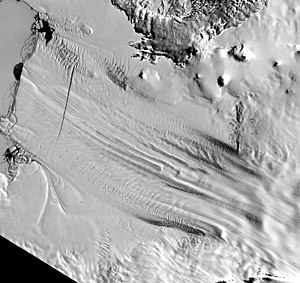 Image via Wikipedia
Image via WikipediaA few notes from watching the videos and reading the articles previously posted.
25 years of satellite data looking at atmospheric temperature shows no significant rise, according to the documentary "Doomsday Called Off". Similar results are seen in data from weather balloons over the same period. Other articles show a global temperature rise, using the same data.
The sea level around the Maldives has fallen between 20 to 30cm since the 1970s, due to increased evaporation.
The East Antarctic ice sheet is growing due to increased precipitation.
Increased meltwater from Antartica's Pine Island Glacier may be due more to changing sea-bed conditions than to temperature. An undersea ridge appears to have been ground away, and this allows relatively warner seawater greater access to the underside of the glacier....
More on the Maldives:
Professor Niels-Axel Mörner, a leading world authority on sea levels and coastal erosion who headed the Department of Paleogeophysics & Geodynamics at Stockholm University:
The Maldives like other low-lying areas have been condemned by IPCC to become flooded in 50-100 years. The INQUA Commission on Sea Level Changes and Coastal Evolution (the international organisation that hosts the true world specialists on sea level changes) have studied the actual sea level changes in the Maldives and hope to be able to extend the studies to other parts of SE Asia. Our findings reveal that there is no reality behind the scenario of a recent future flooding. The sea level has not been rising in the Maldives in the last centuries and at around 1970 it even experienced a significant lowering. The models of IPCC are simply over-ruled by the theory and observation by sea level specialists within INQUA. We should all be happy about this, one would assume. This is not the case, however. The government of the Maldives has put much prestige in the fear of a future flooding, accusing the west of having caused this situation and demanding them to pay for it. Without a flooding scenario, they now fear that international aid might be cancelled. In this situation, our scientific studies in the Maldives are regarded as anti-governmental and we are now working under very complicated conditions. For the people of the Maldives it is a great relief not to live under a constant threat that all will be gone in one or two generations. For science it is necessary to be able to go on recording the true story and not having to rely on absurd models not anchored in field observations. For a poor country like the Maldives they should always be entitled to become assisted by countries in the west. Furthermore, a coastal country like the Maldives is always threatened by coastal events (storms, hurricanes, tsunamis, etc) that may have disastrous effects on a short-term scale.

No comments:
Post a Comment